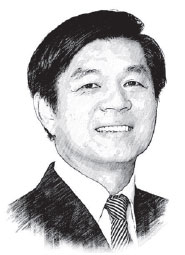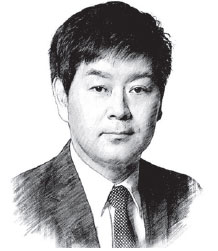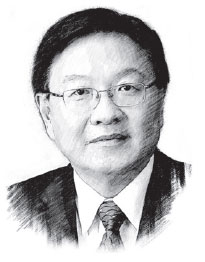

Editor's note: President Xi Jinping has frequently spoke of business opportunities in China for foreign investors in his several speeches made in the ongoing US trip. China Daily reporters have interviewed a group of senior US business executives to learn their views.
Q1: Companies in China are facing the challenge of rising costs. Will this affect your plans in China or will you continue to invest in the country? Do you have any plans to relocate to the US or elsewhere in the region?
Q2: How has the depreciation in the yuan affected your company in China? And will this play a major role in your decision to continue to invest, and expand, in the country and region?
Q3: The Chinese government believes in a stable investment environment and has rolled out policies to help international companies here by increasing transparency. What other measures would improve business efficiency and competitiveness in the country?
Q4: What are the greatest challenges your company faces in China? And how will you deal with those challenges?
Q5: Chinese companies have been looking at the US for investment opportunities as they increase their global footprint. What cultural and social issues will they face? And how would you deal with those issues?
Gan Chee Eng

President of Amway in China, executive vice-president of Amway Corp and chairman of Amway Charity Foundation
A1:
We have faced challenges brought by the mounting costs to our operations here in China. But as the world's largest and most active market, China still has immense development opportunities. To date, we still believe that the Chinese market is of significant importance to Amway's global strategy. Therefore, we will continue to increase our investment in China. With the progress of China's economy, we have seen a crucial trend that is marked by continuous growth of disposable incomes, a gradual rise of the urban population and people's desire to raise their living standard.
A2:
This issue is faced by all foreign investment enterprises in China. For Amway, our products are all locally manufactured. The exchange rate will have no major impact on us. In fact, many country's currencies relative to the US dollar have dropped dramatically. The international market trend has resulted in RMB quoting reform and it is a normal response and the volatility is minor. We believe the depreciation of the yuan will not continue. The yuan exchange rate is expected to remain at a rational and balanced level. Therefore, the fluctuation in the exchange rate will have a minor impact on our decisions in the Chinese market. We continue to believe that the stable and healthy growth momentum will remain unchanged in the long term.
A3:
First, we are glad to see that the Chinese government is dedicated to the rule of law and is building a legal business environment. At the same time, we sincerely hope China will update its outdated administrative rules, particularly those that go in the opposite direction of an open market economy.
Second, the improvement of efficiency. We have seen China make great achievements in building up a service-oriented government. As a foreign-invested enterprise with a 20-year presence in China, we have felt the change and hope Chinese governments at various levels can do better.
Thirdly, the integration between the Chinese market and global market, particularly in terms of laws and regulations. Since last year, China has set up free-trade zones, a milestone for the country to further its market economy reform and reach out to the global market. Of course, while establishing a free-trade zone, it is important to make sure that the competition between enterprises on two sides of the zones remains fair.
A4:
As the Chinese economy enters a phase of "new normal", the growth rate is slowing down, which has brought challenges to our business and stimulated us to dig further into potential consumption and discover new growth points to unleash consumers' needs. Amway China is seeing a future defined by a new economic model that integrates online and offline businesses.
A5:
I think Chinese enterprises already have a good global vision and have grown more confident and mature on the way to going global. However, they will meet some challenges, particularly in going to a complicated market like the United States. Mainly the challenges lie in the differences in the legal and political systems of the two countries, as well as in terms of community cultures. It takes time. Amway is willing to promote communication and understanding between the two greatest nations in the world.
A6:
No doubt, the visit has in-depth and historical meaning. President Xi Jinping's visit has not only grabbed the world's attention, it has demonstrated a sound image based on the peaceful development and cooperation between China and the US. It is delightful to see the two leaders reach a deeper consensus on how to build a new Sino-US relationship and a collaborative partnership with mutual respect.
Mutual trust and collaboration between the two responsible nations will contribute greatly to global stability and development, between the countries as well as in the Asia-Pacific region.
Chris Lee

President of Medtronic in China
A1:
Undoubtedly, we will keep making significant investments in China. In 2014, we announced the establishment of the company's first global production line for its hemodialysis systems in the High-tech Industrial Development Zone of Chengdu, Sichuan province. We also signed a strategic partnership agreement with the Chengdu city government to expand access to develop new therapies, in order to satisfy clinical and economic needs of China's hospitals, physicians and patients. In addition to that, we expanded our strategic alliance with LifeTech, aiming to jointly produce and manufacture LifeTech pacemakers for China.
Medtronic decided to invest in early stage innovative technology companies, such as Synaptics, which is dedicated to electrophysiology. Besides that, Medtronic has invested in Hanxiputai Company, which focuses on assisting cardiovascular hospitals' trusteeship management, equity holdings and day-to-day management. Medtronic mainly aims to access local investment opportunities through investigating startup companies that own frontier technologies or advanced business ideas.
A2:
The fluctuation in the value of the RMB has had limited impact on our business so far. As a multinational company operating in more than 160 marketplaces, we have been keeping a close watch on the exchange rates of major trade currencies.
A3:
China's current market-oriented economic reforms, including encouraging enterprises to perform in an innovative and economic value manner, are in line with Medtronic's global strategy. In addition to exporting innovative products from the US to China, Medtronic is establishing an R&D facility in China to design products specifically for the Chinese market.
To increase the ability of enterprises to remain profitable over time, besides removing obstacles, the government should continue ensuring the consistency and feasibility of related policies at the level of local authorities. In terms of local products, the government's efforts in boosting foreign manufacturers' innovation in China will also drive productivity and competitiveness of domestic manufacturers.
A4:
As in many other countries, Medtronic still faces an uphill task in improving the accessibility to our advanced therapies in China. To respond to this challenge, we are strengthening localization in R&D and manufacturing to lower product costs, investing in physician and patient education to raise awareness, developing field research projects to establish evidence of cost and clinical benefits of our therapies to the local population and developing innovative partnerships with government institutes to facilitate delivery of care.
A5:
China has become the second-largest economy in the world, and Chinese companies have been making investments in the US. As CNBC reported, there's been an investment influx from China to the US, increasing from about $58 million in 2000 to $14 billion in 2013.
Laws and regulations, language, taxation, labor issues and so in forth are all challenges for Chinese companies running businesses in the US. Actually, like multinationals doing business in China, localization is one of the best strategies. It is the same for Chinese companies doing business in the US.
A6:
I was encouraged by President Xi's strong commitment to improving ties with the US and the attention he pays to the commercial relationship as the anchor of the relationship.
President Xi demonstrated his confidence in China's long-term growth prospects, that it has the resources and economic diversity to withstand downturns, and his commitment to reforms that will open up more sectors and reduce barriers to the market.
Medtronic reached a strategic cooperation agreement with Sichuan province on Wednesday as part of a series of business deals signed during President Xi's state visit. I am proud that Medtronic contributed to the success of this significant historical moment.
Stephen Shang

President and CEO, Honeywell China
A1:
Over the past two to three years, Honeywell has been expanding its capacity in China in areas like turbochargers, performance materials, catalysts and adsorbents, and aerospace. These will enable us to deliver the most cost-effective solutions to our local customers in the most efficient manner. We develop our products locally and now have 2,300 R&D engineers in China.
We have more relevant "East for East" solutions to the Chinese market, we are also improving our efficiency through the Honeywell Operation System Gold Program. We expect our business to grow well and we will continue to invest in China.
A2:
This is much more of a question of competitiveness.
The yuan depreciation is a normal adjustment for a large economy and in the long run will make the country stronger. A strong economy will attract more investment. This is an ecosystem play where China can uniquely combine the strengths of high-quality manufacturing, skilled labor, engineering talent and a strong economy.
A3:
From our perspective, we believe in China and its ability to continue to grow and evolve. That's the reason why we have confidence in China over the long term. China is now Honeywell's biggest country for sales outside of the US. China needs to open up its market and support more private businesses instead of State-owned enterprises.
A4:
Actually, there are still plenty of opportunities for Honeywell when we look at the macro trends around the rising middle class, advancing high-tech manufacturing, urbanization, energy efficiency and environmental protection.
These opportunities are very real and very challenging, particularly when it comes to energy and the environment. It will require applying the most effective technologies at both speed and scale. That is why we will continue to strengthen our understanding of the local markets and customers, as well as deepening our channels and sales.
Honeywell has a unique growth strategy - "East-for-East" in China - leveraging our leading global strength and rich experiences in the fields of energy saving and environmental protection as well as safety and security, to help the Chinese government and local enterprises realize transformation and achieve sustainable growth in a more intelligent way.
A5:
The ability to bring the US and China to work together to solve the world's problems and develop peaceful commercial ties between the two countries continues to be hugely important, because if we can get the world's two biggest economies working well together, that adds to the prosperity for everybody.
Chinese companies must become local, just as US companies need to become local in order to be successful in China.
A6:
From our perspective, we believe in China and its ability to continue growing and evolving. We also think that continuing the ability for the US and China to work together to solve the world's problems and to build peaceful commercial ties is going to be hugely important, not just for countries but the world as well. When the world's two biggest economies work well together, that adds to the prosperity for everybody.
In the long term, reinforcing a sustainable development model through persistent innovations is the key to allow for greater business and economic growth in both China and US.
Technologies exist today that will help companies and governments make tremendous strides immediately. Honeywell will do its part to provide the products and technologies and to reduce even further its own emissions. We should all stand ready to use existing technologies, while also continuing to innovate for a brighter future.
Sean Clarke

President and chief executive officer, Wal-Mart China
A1:
We believe the Chinese economy is undergoing a fundamental transformation, from investment-led to a more consumption-driven and thus a more sustainable model. We see last year's 7.4 percent GDP growth rate as still high compared with elsewhere in the world. As a long-term investor in China, we see vast opportunity going forward. Actually, Wal-Mart continues to outperform the market and gained market share in hypermarkets for the 10th quarter in a row. We are committed to China for long-term investment and growth.
We plan to open 115 new stores and clubs in China from 2015 to 2017, creating more than 30,000 jobs. We also made significant progress in omni-channel efforts by launching "Wal-Mart To Go" in 23 stores in Shenzhen, bringing customers the convenience of ordering through the Wal-Mart app and the choice of in-store pickup or delivery to their home.
A2:
We see ourselves as a local company. Wal-Mart opened the first Supercenter and Sam's Club in Shenzhen in 1996. Wal-Mart has 415 retail units in 166 cities and 20 distribution centers across the country. It is committed to local talent development.
Among our 100,000 associates, 99.9 percent are Chinese nationals, and all our stores in China are managed by local Chinese. We firmly believe in local sourcing. We have established partnerships with more than 7,000 suppliers in China, and over 95 percent of the merchandise in our stores in China is sourced locally. We are fully confident about the Chinese economy and the Chinese market. We will continue to invest and serve more Chinese customers.
A3:
Our mission is to help customers save money and live better, and we welcome all possible ways to achieve this goal. We are very impressed by the government's focus on sustainable development and stewardship of the economy. Despite the moderation of China's growth speed, we can still see 7 percent GDP growth.
We are excited by the Chinese government's determination on opening-up. For example, the Shanghai Free Trade Zone and other FTZs are important testing grounds for economic and financial reforms in China. The newly launched food safety law is another great example of providing clear guidelines and showing determination on the importance of food safety covering all parts of the supply chain.
As a foreign retail market player, we recognize the government's ongoing efforts. Streamlining administration and delegating power to lower levels will help create a more unified and open market environment for fair competition.
A4:
Chinese customers have become more sophisticated, and they expect high quality, authentic goods. They are looking for good value and want good service and safe products at affordable prices. Our retail stores provide a comfortable shopping environment for customers who want to touch and choose the products.
Sam's Club provides unique products to members who are looking for a different experience. Our Wal-Mart To-Go pilot in Shenzhen, as well as our e-commerce platform, YHD, offer customers convenient solutions for their busy lives. In the end, Wal-Mart is committed to being the most trusted retailer in China, and that customers can easily access our rich assortment of safe, quality products, great prices and friendly services.
A5:
Listening to local customers is the key. Since we entered the Chinese market 19 years ago, we have relied on our local associates, partnered with our local suppliers and listened to our local customers. We are a localized company that can leverage unique global resources and supports to best serve Chinese customers. Chinese customers' needs are driving our strategy and business decisions, and we'll continue to look to them for direction on where to innovate next.
(China Daily 09/26/2015 page4)